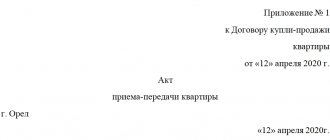Legal grounds
The contract can be terminated on the following grounds:
- By mutual agreement of the parties - when the parties to the transaction made a mutual decision to terminate it, including for personal reasons and reasons. For example, loss of funds, relocation, disruption of some events, force majeure. (Clause 1 of Article 450 of the Civil Code of the Russian Federation).
- At the initiative of one party – terminated in this case by a court decision (clause 2 of Article 450 of the Civil Code of the Russian Federation) if:
- The terms of the deal were significantly violated. For example, failure to fulfill one of the conditions on time, non-payment, discovery of defects in real estate after signing the contract, seizure of property at the claim of third parties.
- The possibility of cancellation of the transaction was provided for in the preliminary purchase and sale document.
How to terminate?
The procedure for terminating a transaction is regulated by Art. 452 of the Civil Code of the Russian Federation. It will depend on what method is chosen for this, whether both parties to the agreement agree to terminate it or whether one party is the initiator.
The procedure is as follows:
- Carefully study all clauses of the contract. As a rule, the preliminary agreement contains a clause on the rules for its termination. If there is no such clause, then the participants have the right to terminate their relationship in accordance with the law. They can come to an agreement, or they will have to defend their interests in court.
- Check compliance with the conditions (the fact of violation will be grounds for termination).
- Check the correctness of the information entered and the execution of the document (an incorrectly drawn up contract can be declared invalid).
- Determine the reason and choose a method for ending the relationship.
With mutual consent of the parties
In this case, you can do without a trial and resolve all issues peacefully.
The parties sign a termination agreement, which has legal force and is drawn up for each participant according to the rules and form of the pre-contract. It must contain the following information:
- date and place of imprisonment;
- passport details of participants and representatives, if available;
- if one of the parties is a legal entity, then its address and name are indicated;
- details of the contract that is being terminated;
- description of the property;
- the date on which the relationship ends;
- clause on the absence of mutual claims;
- the procedure for resolving disagreements if they exist;
- date and signatures of participants.
If the original agreement was certified by a notary, then the same procedure should be followed with the agreement.
Is it possible on the initiative of one of the parties?
If one party wants to terminate the contract, and the other does not agree with it, then the issue is resolved in court. However, before this, the parties are obliged to try to resolve the dispute out of court in accordance with paragraph 2 of Art. 452 of the Civil Code of the Russian Federation. To do this, a notice is sent to the second participant with a proposal to terminate the transaction. It is drawn up in any form and must contain the following information:
- Name;
- initials of participants and their contacts;
- details of the document being terminated;
- references to legal norms that are the basis for termination;
- description of the violation of the terms of the contract or other reasons for cancellation of the transaction (the appendix indicates the documents justifying the right to terminate);
- deadline for response;
- signature and date of registration.
The notice is delivered in person against a receipt or sent by registered mail with return receipt requested. If the other party refuses or the response is not received within the time specified in the agreement or notice, then the demand for termination is submitted to the court. When the deadline for a response is not documented, the law gives time to appeal to the court within thirty days after the notification is sent.
Through the court
A statement of claim for termination of the contract is filed with the district court at the location of the object of the transaction in accordance with Article 30 of the Code of Civil Procedure of the Russian Federation. The following are attached to the claim:
- receipt of payment of state duty;
- passport details of the parties and representatives;
- document of purchase and sale;
- a copy of the notice with confirmation of dispatch or delivery;
- information about calculations, if any;
- extract from the Unified State Register of Legal Entities for a legal entity;
- documentary evidence confirming violation of the conditions;
- power of attorney if a representative is involved.
The application must be made in writing and indicate:
- name of the court;
- plaintiff’s passport details and contacts;
- information about the defendant;
- circumstances giving rise to the appeal to court;
- references to legal norms that are the basis for termination;
- the essence of the requirements;
- list of applications;
- number and signature.
The applicant has the right to additionally submit claims for damages and compensation for moral damage.
Refusal of the buyer to fulfill the supply agreement: grounds, judicial practice, possible risks
Resolution of the Arbitration Court of the Volga District dated 04/07/2021 No. F06-2484/2021 in case No. A12-21910/2020.
Excerpt from the judicial act:
“According to paragraph 1 of Article 523 of the Civil Code of the Russian Federation, a unilateral refusal to execute a supply contract (in whole or in part) or a unilateral change thereof is permitted in the event of a significant violation of the contract by one of the parties (paragraph 4 of paragraph 2 of Article 450 of the Civil Code of the Russian Federation).
A violation of the supply contract by the supplier is assumed to be significant in the following cases: delivery of goods of inadequate quality with defects that cannot be eliminated within a time period acceptable to the buyer; repeated violation of delivery deadlines for goods (clause 2 of Article 523 of the Civil Code of the Russian Federation).
The courts found that the goods were not delivered within the period established by the contract; the contract terminated on July 23, 2020.
The customer’s decision to unilaterally refuse to fulfill the contract dated July 27, 2020 is due, first of all, to a significant violation by the supplier of the terms of the government contract, since the delivery deadline was violated.
The plaintiff repeatedly contacted the defendant with a demand to deliver the goods (letters dated 07/23/2020, 07/29/2020, 07/31/2020, 08/04/2020, 08/05/2020).
At the same time, the defendant did not deliver the goods, including taking no action to deliver them.
Despite the fact that the plaintiff was supposed to deliver the goods by 07/23/2020, the customer on August 4 and 5, 2021 contacted the plaintiff with a demand to deliver the goods provided for in the contract by 08/10/2020.
However, no action was taken by PC-Profi LLC within the specified period.
Having examined and assessed, in accordance with Article 71 of the Arbitration Procedure Code of the Russian Federation, the specified circumstances of the case and the arguments of the parties, the courts recognized that the defendant had repeatedly violated the terms of delivery of the goods, since he did not deliver before 07/23/2020 (the period specified in the contract) and did not deliver until 08/10/2020 ( period specified by the defendant), which, in accordance with Part 2 of Article 523 of the Civil Code of the Russian Federation, is recognized as a significant violation of the supply contract by the supplier.
Based on the foregoing, the courts came to the rightful conclusion that the decision of the State Budgetary Educational Institution “MPK im. V.V. Arnautov" on unilateral refusal to fulfill the contract, the force of Articles 523, 526 of the Civil Code of the Russian Federation, Article 95 of Law No. 44-FZ is legal, since the fact of a significant violation by the supplier of the terms of the contract has been proven (the goods were not delivered within the period established by the contract); at the time of termination of the contract, the company had not started delivery.”
Resolution of the Arbitration Court of the Central District dated July 29, 2020 No. F10-1915/2020 in case No. A36-9214/2019.
Excerpt from the judicial act:
“The goods must be delivered before 06/13/2019.
Since the goods were not delivered within the prescribed period, the institution sent the entrepreneur a claim dated June 14, 2019 No. 409, demanding delivery by June 18, 2019, and warned of the right to make a decision on unilateral refusal to fulfill the contract in the event of non-delivery of the goods within the specified period...
The courts found that the entrepreneur did not deliver the goods either by 06/13/2019 or by 06/18/2019. On July 26, 2021, the goods were delivered incompletely and were accepted by the institution for safekeeping...
According to paragraphs 1, 2 of Article 523 of the Civil Code of the Russian Federation, a unilateral refusal to execute a supply contract (in whole or in part) or a unilateral change thereof is permitted in the event of a significant violation of the contract by one of the parties (paragraph four of paragraph 2 of Article 450). A violation of the supply contract by the supplier is assumed to be significant in the event of repeated violation of the delivery deadlines for goods.
As can be seen from the case materials and established by the courts, the entrepreneur repeatedly violated the delivery deadline and, as a result, did not deliver a complete set of equipment, and the supplied equipment did not meet the characteristics of the equipment the supply of which was provided for in the contract.
Under such circumstances, the arguments of the cassation appeal about preventing the supplier from entering the customer’s territory to install equipment do not deserve attention.
Having come to the conclusion that the entrepreneur had significantly violated the terms of the contract and the institution’s justified unilateral refusal to fulfill the contract, the court refused to satisfy the entrepreneur’s demands.”
Resolution of the Arbitration Court of the West Siberian District dated 02/06/2020 No. F04-6534/2019 in case No. A03-23601/2018.
Excerpt from the judicial act:
“In accordance with paragraph 1 of Article 523 of the Civil Code of the Russian Federation, a unilateral refusal to execute a supply contract (in whole or in part) or a unilateral change thereof is permitted in the event of a significant violation of the contract by one of the parties (paragraph four of paragraph 2 of Article 450 of this Code).
A violation of the supply contract by the supplier is assumed to be significant in the event of repeated violation of the terms of delivery of goods (clause 2 of Article 523 of the Civil Code of the Russian Federation)…
Having examined and assessed in aggregate and the relationships in accordance with the rules of Article 71 of the Arbitration Procedure Code of the Russian Federation the circumstances of the case and the available evidence, having established that the terms of the contract provide for the right of the plant to unilaterally refuse to fulfill it, having established that the company has repeatedly violated the terms of delivery of goods agreed upon by the parties, taking into account facts of under-delivery of goods according to two applications accepted by the company for execution, the courts came to a reasonable conclusion about a significant violation by the supplier of the terms of the contract, the plant’s lawful decision to unilaterally refuse to fulfill it, and therefore correctly refused to satisfy the company’s claim.”
Resolution of the Arbitration Court of the West Siberian District dated October 8, 2019 No. F04-3690/2019 in case No. A45-41639/2018 (Decision of the Supreme Court of the Russian Federation dated December 25, 2019 No. 304-ES19-24256 in case No. A45-41639/2018).
Excerpt from the judicial act:
“Based on Article 523 of the Civil Code of the Russian Federation, paragraph 14 of Article 95 of Law No. 44-FZ, paragraph 11.1 of the contract, the Institution sent a letter to the Company dated 10/30/2018 No. 5606 about its decision dated 07/09/2018 No. 17884 on unilateral refusal to perform the contract in connection with repeated violations by the Company of delivery deadlines for goods...
In accordance with paragraph 1 of Article 523 of the Civil Code of the Russian Federation, a unilateral refusal to execute a supply contract (in whole or in part) or a unilateral change thereof is permitted in the event of a significant violation of the contract by one of the parties (paragraph four of paragraph 2 of Article 450 of this Code).
A violation of the supply contract by the supplier is assumed to be significant in the event of repeated violation of the terms of delivery of goods (clause 2 of Article 523 of the Civil Code of the Russian Federation)…
Having examined and assessed in aggregate and the relationships in accordance with the rules of Article 71 of the Arbitration Procedure Code of the Russian Federation the circumstances of the case and the available evidence, having established that the Company has repeatedly violated the terms of delivery of goods under the contract according to orders (specifications) dated July 11, 2018 No. ZAK0120380, dated July 18, 2018 No. ZAK0120714, dated 31.07.2018 No. ZAK0121349, dated 13.08.2018 No. ZAK0121974, dated 20.08.2018 No. ZAK0122320, dated 31.08.2018 No. ZAK0123101, dated 19.09.2018 No. ZAK0124143, dated 16.10.2 018 No. ZAK0125899, the courts came to a reasonable conclusion about the significant and repeated violation by the Company of the terms of the contract, the Institution’s lawful refusal to fulfill the contract, in connection with which the Company was correctly refused to satisfy the claims...
The courts rightfully took into account the fact of repeated violations by the supplier of the terms of the contract in terms of delivery within the period agreed upon by the parties, in connection with which the correct conclusion was made that there were no grounds for canceling such a decision on unilateral refusal to fulfill the contract in accordance with Part 14 of Article 95 of Law No. 44- Federal Law".
Resolution of the Arbitration Court of the North Caucasus District dated October 13, 2016 No. F08-7000/2016 in case No. A53-33865/2015.
Excerpt from the judicial act:
“By the decision dated 04/11/2016, upheld by the appellate court ruling dated 06/17/2016, the claim was denied. The judicial acts are motivated by the fact that in connection with a significant violation of obligations by the company, management has the right to terminate the contract unilaterally in connection with a significant violation of the company’s obligations...
Having studied the case materials and the arguments set out in the cassation appeal, and listened to a representative of the department. Having supported the arguments of the review, the Arbitration Court of the North Caucasus District believes that judicial acts should be left unchanged...
The courts, refusing to satisfy the claim, found that the management sent an application for the supply of goods to the company’s email address ( [email protected] No.dex.ru), in which it asked to inform the delivery date. In the application, the management indicated that the company’s contact telephone number was not responding. On August 4, 2015, the management again sent an application with identical content to the company’s email address, in response to which on August 6, 2015, the company informed that delivery would begin in mid-August. The department sent claims to the company dated 09/10/2015 and 09/17/2015 about failure to fulfill obligations to supply goods. In notification No. 21/301/6/3-9034 dated 08/05/2015, the department informed the society of the need to submit a schedule for the supply of firewood and begin supply. In the request dated September 14, 2015 No. 21/301/33/10549 (received by the company on September 24, 2015), the management indicated the need to supply the goods within 5 days and notified the company of a unilateral refusal to fulfill the contract in the event of non-delivery of the goods.
By virtue of paragraphs 1 and 3 of Article 450 of the Civil Code of the Russian Federation, amendment and termination of the contract are possible by agreement of the parties, unless otherwise provided by the said Code, other laws or the contract. In the event of a unilateral refusal to fulfill the contract in whole or in part, when such refusal is permitted by law or by agreement of the parties, the contract is considered respectively terminated or modified. By virtue of paragraph 1 of Article 523 of the Civil Code of the Russian Federation, a unilateral refusal to execute a supply contract (in whole or in part) or a unilateral change thereof is permitted in the event of a significant violation of the contract by one of the parties (paragraph 4 of paragraph 2 of Article 450 of the Civil Code of the Russian Federation). A violation of the supply contract by the supplier is assumed to be significant in the event of repeated violation of the terms of delivery of goods (paragraph 3 of paragraph 2 of Article 523 of the Civil Code of the Russian Federation). The company did not refute the management’s argument, confirmed by the case materials, about repeated violation of delivery deadlines, including after sending a demand dated September 14, 2015 No. 21/301/33/10549, and did not provide evidence of sending notifications to the defendant about readiness for delivery of goods.”
Resolution of the Arbitration Court of the East Siberian District dated March 14, 2016 No. F02-775/2016 in case No. A33-11660/2015.
Excerpt from the judicial act:
“By virtue of paragraphs 1, 2 of Article 523 of the Civil Code of the Russian Federation, a unilateral refusal to fulfill a supply contract is permitted in the event of a significant violation of the contract by one of the parties. A violation of the supply contract by the supplier is assumed to be significant in the event of repeated violation of the delivery deadlines for goods.
As established by the courts, the fact of repeated (second and third quarters of 2014) violation of the terms of delivery of goods by Hector LLC under the government contract is confirmed by the case materials; There is also no evidence of consideration by Hector LLC of the claims sent by the customer in July and October 2014 in the case materials.
Under such conditions, the courts came to a reasonable conclusion that Hector LLC violated the essential terms of the state contract dated March 31, 2014 No. 2014.52976, and therefore the Krasnoyarsk Regional Narcological Dispensary No. 1 had grounds for unilateral refusal to fulfill the contract "
Resolution of the Seventeenth Arbitration Court of Appeal dated December 28, 2020 No. 17AP-14448/2020-AK in case No. A60-24735/2020 (Decision of the Supreme Court of the Russian Federation dated June 9, 2021 No. 309-ES21-7960 in case No. A60-24735/2020).
Excerpt from the judicial act:
“At the same time, a violation of the supply agreement by the supplier is assumed to be significant in the event of repeated violation of the delivery time of goods (paragraph 3 of paragraph 2 of Article 523 of the Civil Code of the Russian Federation).
Clause 2.1 of the contract provides for the delivery time for goods: 2019 - from the date of conclusion of the contract, delivery is 7 calendar days, that is, no later than November 25, 2019, 2021 - delivery from 01/09/2020 to 01/27/2020.
From the case materials, it appears that the supply of goods as part of the fulfillment of obligations under the contract was made according to invoices No. GS2607 dated 12/18/2019 in the amount of 63,285 rubles, No. GS9 dated 01/13/2020 in the amount of 247,480 rubles, No. GS240 dated 03/23. 2020 in the amount of 489,673 rubles, No. GS267 dated 03/27/2020 in the amount of 497,510 rubles, No. GS268 dated 03/27/2020 in the amount of 75,942 rubles, the goods were accepted by the customer according to acts of acceptance and transfer of goods dated 12/18/2019, dated 13/01 .2020, dated 03/23/2020.
Thus, the case materials confirm the company’s repeated violation of the delivery deadlines established by clause 2.1 of the contract, in connection with which the defendant had the right to unilaterally refuse to fulfill the contract, which was expressed in letter No. 379 dated March 23, 2020.”
Resolution of the Fifteenth Arbitration Court of Appeal dated December 25, 2020 No. 15AP-17198/2020 in case No. A53-10384/2020.
Excerpt from the judicial act:
“The decision is motivated by the fact that delivery time is an essential condition of the contract. The plaintiff committed a violation of the delivery time for goods, and therefore the customer rightfully decided to refuse to fulfill the contract...
In letters dated 02/27/2020, the institution informed the company that there was no possibility of terminating contract No. 9000548-O dated 12/16/2019 by mutual agreement of the parties and indicated the need to complete the delivery no later than 02/28/2020 (vol. 1 pp. 51, 54-55 ).
In a letter dated 03/02/2020 (vol. 1 case file 52), the institution indicated the need to complete the delivery no later than 03/02/2020, otherwise, it announced a decision to unilaterally refuse to fulfill the contract.
Since the goods were not delivered on time, Municipal Budgetary Institution “City Hospital No. 1 named after. ON THE. Semashko, Rostov-on-Don" On 03/04/2020, decision No. 35-z (vol. 1, pp. 56) was made on unilateral refusal to execute contract No. 9000548-O dated 12/16/2019...
By virtue of Article 523 of the Civil Code of the Russian Federation, a unilateral refusal to execute a supply contract (in whole or in part) or a unilateral change thereof is permitted in the event of a significant violation of the contract by one of the parties (paragraph four of paragraph 2 of Article 450).
Paragraph 2 of Article 523 of the Code establishes that a violation of the supply contract by the supplier is presumed to be significant in cases of repeated violation of the terms of delivery of goods.
According to the calendar plan (Appendix No. 3 to the contract), the delivery of goods is carried out during 2021 no more than 5 times a month, within 5 days from the date of receipt of the customer’s application.
From the case materials it follows that applications for the need to supply goods were sent to the email of Vial Trading House LLC on 02/19/2020 and 02/26/2020 (case sheet 57-58).
Due to the supplier’s failure to fulfill its obligations to deliver goods on time, on March 4, 2020, the customer decided to unilaterally refuse to fulfill contract No. 9000548-O dated December 16, 2019.”
Resolution of the First Arbitration Court of Appeal dated July 16, 2020 No. 01AP-2555/2020 in case No. A43-11031/2019 (Decision of the Supreme Court of the Russian Federation dated March 2, 2021 No. 301-ES21-276 in case No. A43-11031/2019).
Excerpt from the judicial act:
“At the same time, a violation of the supply agreement by the supplier is assumed to be significant in the event of repeated violation of the delivery time of goods (paragraph 3 of paragraph 2 of Article 523 of the Civil Code of the Russian Federation).
From the case materials, it is clear that under the terms of the contract, the defendant, by December 25, 2018, was obliged to supply a software and hardware system for managing the flow of visitors (electronic queue), as well as its installation, software configuration, and commissioning.
At the same time, the defendant did not fulfill his obligations by December 25, 2018.
The plaintiff sent a claim to the defendant dated December 26, 2018 No. 13/5400/8595 demanding that he fulfill his obligations under the contract as soon as possible.
With claims dated 01/15/2019 No. 13/5400/120, dated 01/17/2019 No. 13/5400/220, the plaintiff demanded to fulfill obligations under the contract by 01/16/2019, by 01/23/2019, respectively.
However, the defendant did not fulfill its obligations under the contract within the established time frame.
Under the above circumstances, the court came to the conclusion that the case materials confirm the defendant’s systematic violation of the obligation to supply goods.
When analyzing the circumstances of the case and the evidence presented in the case, taking into account the provisions of paragraph 3 of paragraph 2 of Article 523 of the Civil Code of the Russian Federation, the court came to the conclusion that the defendant committed a significant violation of the terms of the contract for the purchase of goods (supply agreement) dated 12/04/2018 No. UAEF -79/18., which served as the basis for satisfying the request of the Federal Budgetary Institution “Nizhny Novgorod Center for Materials and Mathematics” to terminate the contract for the purchase of goods (supply agreement) dated December 4, 2018 No. OAEF-79/18.”
Resolution of the Sixteenth Arbitration Court of Appeal dated 04/08/2019 No. 16AP-870/2019 in case No. A63-15600/2018.
Excerpt from the judicial act:
“According to clause 5.1 of the contract, the delivery of goods is carried out by the supplier within 10 (ten) working days from the date of receipt of the application from the customer.
Meanwhile, the plaintiff did not deliver the goods to the defendant within the time period specified in clause 5.1 of the contract.
On July 26, 2018, the defendant sent a repeated application at the request of the supplier, indicating catalog numbers for some items.
In turn, the plaintiff made a partial delivery of goods in the amount of 1,842,939.14 rubles, which is confirmed by primary documents: delivery note No. 68 dated 08/08/2018, invoice for payment No. 68 dated 08/08/2018 (input No. 3407 dated 08/20. 2018) in the amount of 776,322 rubles, delivery note No. 67 dated 08/04/2018, payment invoice No. 67 dated 08/04/2018 (input No. 3410 dated 08/20/2018) in the amount of 202,351.20 rubles, delivery note No. 64 dated 07/30/2018, payment invoice No. 63 dated 07/30/2018 (input No. 3339/2 dated 08/14/2018) in the amount of 49,412.14 rubles, delivery note No. 53 dated 07/16/2018, payment invoice No. 57 dated 07/16/2018 (input No. 3339/3 dated 08/14/2018) in the amount of RUB 814,853.80. The goods were delivered by the plaintiff in violation of clause 5.1 of the contract - 08/14/2018 and 08/20/2018.
Thus, there were repeated violations of the delivery deadlines on the part of the supplier.
According to paragraph 1 of Article 523 of the Civil Code of the Russian Federation, a unilateral refusal to execute a supply contract (in whole or in part) or a unilateral change thereof is permitted in the event of a significant violation of the contract by one of the parties (paragraph four of paragraph 2 of Article 450).
A violation of the supply contract by the supplier is assumed to be significant in the event of repeated violation of the terms of delivery of goods (paragraph 3 of paragraph 2 of Article 523 of the Civil Code of the Russian Federation)…
The court of first instance correctly established that the company repeatedly violated the terms of delivery of goods, and that within 10 days from the date of the hospital’s decision to refuse the contract, the company did not fulfill its obligations to supply goods in full. Meanwhile, the company has not provided evidence that it took all measures within its power to comply with the terms of the contract, that a violation of the terms of the contract on its part occurred due to circumstances beyond its control or through the fault of the customer.
In such circumstances, having assessed the documents submitted to the case materials on the basis of Article 71 of the Arbitration Procedural Code of the Russian Federation and having established that the plaintiff’s delivery date for the goods was overdue, while the plaintiff did not eliminate the violations within the prescribed period and did not deliver the goods, the court of first instance came to there was a reasonable conclusion that the defendant had the right to unilateral refusal in accordance with paragraph 1 of Part 15 of Article 95 of Law No. 44-FZ, and therefore there were no grounds for recognizing the customer’s decision to unilaterally refuse to perform the contract as invalid.
Thus, the conclusions of the trial court on the refusal to satisfy the claims correspond to the circumstances established based on the results of the study and assessment of the evidence.”
Resolution of the First Arbitration Court of Appeal dated December 4, 2018 No. 01AP-8016/2018 in case No. A39-2194/2018.
Excerpt from the judicial act:
“Due to the defendant’s repeated non-delivery of products, JSC K NPO Aurora, guided by Article 523 of the Civil Code of the Russian Federation, sent to the Contractor on 02/06/2018 a notice of unilateral refusal to fulfill the Agreement and the return of the unpaid advance in the amount of 1,344,352 rubles 12 kopecks. The notification was received by the defendant on February 15, 2018 and was left unsatisfied.
These circumstances served as the basis for the plaintiff to file this claim in court...
Contrary to the arguments of the appeal, the buyer sent applications for the manufacture and supply of indicators dated November 11, 2015 No. 33410/12-3272, dated July 13, 2015 No. 33410/12-2254, dated May 14, 2015 No. 33410/12-1652, dated August 24, 2015 No. 33410/12-2527, dated 08.24.2015 No. 33410/12-2526, dated 08.24.2015 No. 33410/12-2525, dated 09.24.2015 No. 33410/12-2925, dated 09.24.2015 No. 33410/12-2 924 .
In accordance with paragraphs 1 and 2 of Article 523 of the Civil Code of the Russian Federation, a unilateral refusal to execute a supply contract (in whole or in part) or a unilateral change thereof is permitted in the event of a significant violation of the contract by one of the parties (paragraph four of paragraph 2 of Article 450).
A violation of the supply contract by the supplier is assumed to be significant in the event of repeated violation of the delivery deadlines for goods.
The repeated violation of delivery deadlines in the case under consideration is confirmed by the terms of the contract and the correspondence of the parties, presented in the case materials, and has not been refuted by the defendant.
In this regard, the fact that for the manufacture of products ordered by the plaintiff, components of the manufacturer and supplier - Orbita JSC, which refused Neon JSC to supply these components, are used, do not relieve Neon JSC from the obligation to return the money under a terminated contract.
Having examined the case materials and verified the applicant’s arguments set out in the appeal, the appellate court considers the decision of the trial court to satisfy the claims to be justified.”
Financial implications
When the parties terminate the relationship and challenge the transaction in court, it is fundamentally important to understand in what capacity the funds were contributed under the agreement and whether they were contributed at all. The consequences of returning the money will depend on this.
- If the original contract provided for and paid an advance, which is a preliminary method of payment, and the transaction did not take place, then the money must be returned without fail, regardless of whose fault the main contract was not concluded.
- If the original agreement provided for and paid a deposit, which is a way to secure the obligation, then if the deal fails, the consequences for the participants will be different. If the party who gave the deposit withdraws from the contract, the deposit is not returned. If the seller refuses the contract, he is obliged to return double the amount of money to the buyer.
- If the text of the preliminary purchase and sale document did not contain conditions for the payment of money, but they were transferred to the seller, then bank statements and witness statements may become evidence in court, and the money can be returned.
The conclusion of a preliminary agreement does not mean that the main transaction will take place. If better options arise or difficult situations arise, sometimes even beyond the control of the parties, the contract can be terminated. But the participant taking action to terminate the relationship must act reasonably and in good faith so that there are no negative consequences for the other participant in the transaction.
Where to file a claim
Property disputes fall within the jurisdiction of both the magistrate and district or city courts. It all depends on the amount of the claim: if it is less than 50,000 rubles, the claim must be submitted to a magistrate, if more, to a district or city court. If the case is related to the protection of consumer rights, the price limit increases to 100,000 rubles (if the amount of the claim is up to 100,000 rubles, the claim is submitted to a magistrate). If a claim is filed only for termination, then it should be filed in the district or city court, since it is non-property.
The document is submitted at the place of residence of the defendant or at the location of the legal entity.








